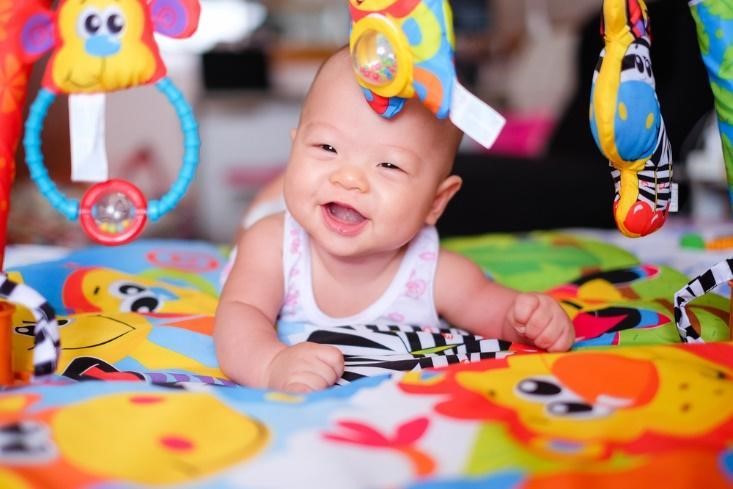Help babies grow and learn by providing new opportunities for play
As a quality caregiver, part of your day includes organizing meaningful activities for all the children in your care. However, when it comes to infants, it can be more difficult to engage them beyond the basics of routine care and playful conversation. After all, they’re not enthusiastically participating in activities or making requests – they seem mostly content to have their needs met while enjoying some affectionate social interaction.
Although they’re not begging to play at their favorite activity center, infants are at a valuable phase of development and are learning about the world around them. Support this growth and their unspoken curiosity by incorporating games and learning opportunities for babies into your caregiving routine.
Fun for baby
Provide stimulating activities for the babies in your care by trying the following.
Tummy time
Now that babies sleep on their backs, as recommended by the American Academy of Pediatrics, they often need some additional encouragement to build up the muscles in their neck and upper body.
Spend a little time each day supervising babies as they lie on a blanket on their bellies. Place some interesting objects, fun toys, or a babyproof mirror within arm’s reach to encourage them to lift their heads, stretch, reach, roll, and crawl.
Body parts
Babies love looking at silly faces and exploring things with their hands. Make exaggerated expressions and guide the baby’s hands to different features on your face while saying the associated word. “That’s my nose! Where’s your nose?” and then point to baby’s. Do a similar activity with the different body parts of stuffed animals while helping them touch the different textures associated with each.
Wrapped up
Boxes are a universal plaything for young children of many ages, and babies are no exception. Gift wrap empty boxes and let the baby have a ball exploring the bright colors and unique sensations associated with crinkling and ripping paper. You can also hide a toy within a box with a removable top, and let the baby explore problem-solving skills to discover it.
Splish-splash
Add a new element to outdoor time by giving babies a shallow pan full of water and some measuring cups and ladles. The act of scooping, pouring, and splashing helps teach cause and effect and allows them the joy of independent play with close supervision.
Pull toys
Let babies pretend to fish by tying a piece of yarn to stuffed animals or to rolling toys such as trains or trucks, and show them how to pull the toys toward them. This unique take on playing with toys helps babies develop motor skills and reinforces cause and effect.
Everyday treasures
Create a sensory experience for babies by making treasure boxes full of everyday objects with interesting textures, shapes, sounds, or finishes. For example, a shiny spoon, paintbrush, piece of corduroy, piece of crinkly wax paper, silky ribbon, or remote without batteries may seem like junk drawer items to us, but such things represent a whole new world to them.
Babies are easily entertained, but that doesn’t mean you shouldn’t make an effort to engage with them. Encourage curiosity and challenge their current skills by helping babies explore new ideas and activities that will help them grow and learn while having fun. The Virginia Infant & Toddler Specialist Network helps improve the quality of care for infants and toddlers through extensive resources, services, and education for caregivers. Learn more about how we can help you improve the standard of care.




